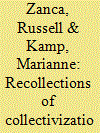| Srl | Item |
| 1 |
ID:
079327


|
|
|
|
|
| Publication |
Bloomington, Indiana University Press, 2007.
|
| Description |
xi, 401p.hbk
|
| Standard Number |
9780253348838
|
|
|
|
|
|
|
|
|
|
|
|
Copies: C:1/I:0,R:0,Q:0
Circulation
| Accession# | Call# | Current Location | Status | Policy | Location |
| 052655 | 958.04/SAH 052655 | Main | On Shelf | General | |
|
|
|
|
| 2 |
ID:
152008


|
|
|
|
|
| Summary/Abstract |
Collectivization of agriculture in Uzbekistan demanded the efforts of many local agitators who called on Uzbek dehqons to join kolkhozes, and who stimulated a local version of class warfare. In oral history interviews with those who experienced mass collectivization’s first moments, we find both the brutality of change imposed from above and a social transformation led by local Uzbek activists. We argue that Uzbek agitators allowed many dehqons to identify with this project to change rural land ownership, and that their offers of tangible benefits, such as advance payments for cotton crops and distribution of food, provided strong incentives for joining. Class rhetoric was important as activists divided the poor from the kulak and used threats of dekulakization, as well as incentives, to promote rapid collectivization.
|
|
|
|
|
|
|
|
|
|
|
|
|
|
|
|
| 3 |
ID:
181819


|
|
|
|
|
| Summary/Abstract |
Recalling knowledge and instruction about Central Asia toward the end of the Cold War (1945–91) in the United States, this article provides a retrospective on an anthropologist’s coming of age and ability amidst prevailing interests and convictions concerning the region. It continues to discuss some of the early topics and studies that initiated a grounded approach to understanding Central Asia ethnographically as it broadens the analysis via a consideration of contributions from Europe and Central Eurasia. Not a literature review per se, the article focuses on some major concerns among anthropologists and their subjects since the beginning of independence. It then concludes that while studies have developed in complexity and theory within our field, we continue writing about culture via overarching political and economic systems that inform how we apprehend the world. The multiple and overlapping identities of Central Asians will continue to occupy much of our academic thinking for years to come.
|
|
|
|
|
|
|
|
|
|
|
|
|
|
|
|